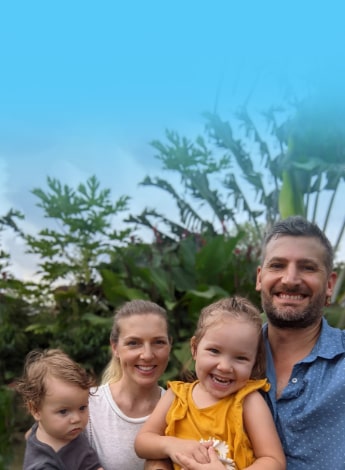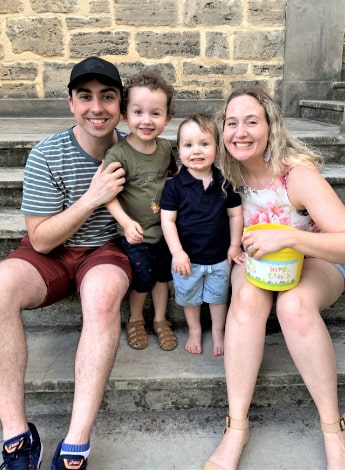
Career, interrupted

Navigating a successful physiotherapy career while simultaneously raising a family— is it possible to do both? Here, InMotion presents the first in a series of articles that share the personal experiences of physiotherapist parents as they meet the daily challenges of juggling work or study and a successful home life.
Part-time clinician
Lauren Kaethner, APA Sports and Exercise Physiotherapist, Northern Territory, mother of two
I’m about 13 years out of university now; I graduated in 2007 from La Trobe University and did my master’s in sports physiotherapy there, finishing in 2015.
I’ve worked mostly in private practice, and for the last few years have worked as the clinical manager at Territory Sportsmedicine in Darwin.
Having children (Sophia, three, and Henrik, nine months) has been more rewarding and wonderful than I could have ever imagined.
But despite feeling in many ways that private practice physio is a great job to have as a working mum, returning to work has still presented more challenges than I expected.
I’m in a fortunate position because, although our families are interstate, I have a wonderful husband and a workplace that is flexible and supportive.
But returning to work has still been difficult at times.
I love my work and I missed it when I was on maternity leave. I would still have long conversations with my boss and colleagues while on leave, and I’d pop in regularly.
I returned to work when Sophia was eight months old, working three days a week.

In some ways, I felt ready to return to work because I felt a commitment to the practice and missed the different interactions as well as the income, but it was still hard to be away from my daughter.
Sadly, my director and close friend Karen Schneider passed away when I was on maternity leave with my second child.
It was a really difficult time for everyone, and I felt like I needed to return to work soon after this to try and help at the practice.
But being back at work has also been a huge support to me during this time. Henrik was just six months old when I went back, which I struggled with, but I am thankful to have been able to start with just two days per week and gradually build on this.
I think getting the work–life balance right is difficult, and whatever decisions I have made to try and achieve a balance I second guess if I have over-compromised time with the children or my work commitments.
I care deeply about our practice and staff and get excited about being able to contribute to that, so it can be difficult to say no at times when opportunities pop up, or to squeeze in an extra patient at the end of the day.
As many parents can relate, there are often a number of sick days associated with starting childcare, and having to reschedule patients within limited clinical hours can be difficult.
But it’s all part of it and I feel thankful that there hasn’t been any extra pressure from work.
Nevertheless, there can still be some feelings of guilt associated with not being as reliable as I’d like to be.
I did my master’s in sports physio is 2015 but the commitment of doing lots of sports coverage on weekends and after hours, and travelling with teams (something I did a lot of previously) isn’t feasible right now.
Having children has changed my direction slightly and I’ve studied my MBA while on maternity leave and working part time to continue to progress personally and professionally.
The logistics of breastfeeding is a challenge that I didn’t expect.
I was motivated to breastfeed until 12 months but neither of the kids took to a bottle so it has meant driving across town to day care to breastfeed at lunchtime, or having my husband bring the baby into work for a quick feed between patients if I’ve worked on a Saturday or am doing some sports coverage.
Keeping up with PD can also be difficult. With limited PD options in Darwin, it’s common to travel interstate, which has meant taking the whole family. This has been fun but is also a costly exercise.
I’ve been thankful for the recent increase in high-quality online PD that’s available, as this has made keeping up with continuing education more achievable.
Returning to work has presented many conundrums and meant constantly trying to balance what’s right for our family while still trying to maintain a career.
But overall, I am grateful to be part of a profession and practice where I have felt supported and been offered lots of flexibility.
I have also gained a huge appreciation for how amazing working mums and parents are, who work so hard to juggle so many commitments while raising a family (often with very little sleep!).
Researcher clinician
Carol Chan, APAM, New South Wales, mother of two
I graduated from The University of Sydney in 2003 and I started my career as a cardiorespiratory physiotherapist in a public hospital.
I took on a clinical educator position few years later, where supervising undergraduate students from universities had become a major part of my role.
Eight years into my career I started my family. Working in the acute surgical and medical wards was not easy in the child-bearing year.
The physical demands from the job had become a challenge, and thankfully I had a very supportive team to share the load with me when I was heavily pregnant.
My children, Chatwin and Ryan (age 10 and nine), allowed me to have the first-hand experience to understand the physical, emotional and psychological challenges at work and the struggles in the post-natal recovery that all mothers go through during their pregnancies and motherhood.
This experience had inspired me to work in the women’s health are; therefore I began doing the women’s health professional development courses through the APA and other training institutes during maternity leave.
Soon enough I realised I needed a flexible job in order to raise the family and to keep up my career goals.
I started up my private practice, working with a group of specialists where I continued to consolidate my clinical knowledge and practice in pelvic floor disorders, particularly in the colorectal area.
I had further developed an interest in clinical research which I started my part-time PhD study three years ago.
I’m lucky that I have good family support and have the ability to make my own arrangements for my clinical and research work.

That gives me the flexibility to work, study and look after the young kids.
My clinical hours are mainly within school hours, which has certainly impacted on the service; however, I get to stay focused in those hours and can be very productive.
A good timetable that I keep to saves me from over-committing and I can make sure I am around my kids in their childhood.
But I still squeeze in some work on my laptop while waiting for the kids to finish their music or sport so I can meet the research deadlines.
The tightly packed schedule sometimes means a huge catch-up when things didn’t go to plan, especially when there’s a late turn up of appointment, an over-run clinic or a meeting.
I guess it’s all about organising and prioritising.
My advice to other working parents is don’t hesitate to ask for support. You need the support, not only in the first year but in at least the first five years where you find yourself juggling work and family commitments.
Have a working timetable with your family, a support network and being prepared for changes with some plans will help keep you on track with your career and maintain a happy family.
Raising a family mid-career is not an interruption, but rather a gift. It is definitely a learning journey for me to re-direct my career goal and passion.
Student
Emma Axt Conaghan, APAM, Perth, mother of two
I am currently a final-year physiotherapy student studying at a university in Perth. I studied full time during my first year in 2016, then I had my sons during the course of the degree and did part-time study for the four years in the middle.
Rory, my eldest, is nearly four, and Lachlan is nearly two. I am now back studying full time in my sixth and final year and am completing my practical placements.
I grew up in the USA, just outside Minneapolis. When I emigrated to Perth in 2010, I wasn’t really even aware of what a physiotherapist was, so a career in that field wasn’t on my radar.
In the States, the equivalent field is physical therapy, which is slightly different to physiotherapy.
The first time I went to university back in the States, I didn’t have a clear idea of what I wanted to do professionally, and I ended up completing a Bachelor of Arts in topics that interested me at the time (double major in journalism and romance languages).
I remember after I graduated, I heard a friend of mine from high school was doing physical therapy, and I wished I had realised that was an option before I started my studies.
When I came to live in Australia I saw how much more of a primary care role that physiotherapy is involved in, and it became really appealing.
Similar to many who are drawn to this field, I was into sport and found myself injured and seeing physios regularly.
I just got the sense that it was something I’d really liked to do, and once I finally got my citizenship I started studying to be a physio.
My husband and I very much wanted to have children, and we were realistic that we would have at least one during the course of my degree.
I’m in my mid-30s now, but I started studying physiotherapy when I was 29, and we knew that it was the right time for us to start a family.

I was aware that I would have to put my kids in day care, so I put each of them on the waitlist for the childcare facility at my university before they were born.
Having them on campus with me helped with the logistics of feeding when they were babies. Prior to starting day care at around nine months old, my older son spent my uni days with his grandmother.
For our second child, my husband took four months’ parental leave so we could put off starting my son in day care until he was eight months old.
Each semester I work with the university to ensure my schedule allows me to have days at home with my kids. The school has always been outstanding at helping me be on campus as few days as possible, so that I have those days at home with the boys.
I never got to have that big chunk of time off to be with either of them, so it is important to me that I have at least a day or two with them during the week.
This year, when I’m on full-time practical placements, I only get to spend evenings and weekends with them, so I make sure to make the time count.
My family are all back in the States, but I do have my in-laws here (my husband is Australian), so that’s a big help.
My son Rory now goes to kindy but the little one still goes to day care a few days a week. When I’m not on prac, I get a couple of days a week at home with them, so it’s a nice balance.
People ask me all the time about how I cope with studying, working and having two children under five. I am brutally honest and say that it’s really challenging.
Unfortunately I’m one of those people who is a bit of an overachiever as a student as well, which doesn’t help. I am definitely not one to coast (not that you can really coast in physiotherapy) and am very motivated to be a high achiever.
It has helped that both the administration and teaching staff at my uni have gone above and beyond in supporting me in every way that I’ve needed through both pregnancies and after my children arrived.
I don’t think I’d have had even half the success I’ve had without the school backing me up whenever I needed it. It has also helped that I’ve formed a strong network of women with whom I socialise regularly.
All mothers should have a close tribe around them for support, it makes all the difference.
One of the most challenging aspects of juggling family and study is that feeling sometimes, when it gets overwhelming, that you’re not doing the best that you could be in either area.
Feeling like I’m not getting the most that I could out of my study or that I’m not being the best mum that I can be. I’ve developed some good habits to combat this. I’m really good at recognising when I’m in the right mood to study and going with it.
I’m also not a procrastinator at all; I always make sure my assignments are done weeks in advance. As soon as I can do them, I do them, because you never know what’s going to come up.
To prioritise my kids, I don’t tend to do a lot of study on the weekends. I make weekends about my family.
My husband is incredibly helpful, too, and is an amazing father. His support has been invaluable all throughout my degree and in our transition to parenthood.
Something that we did in the last year that has helped us is we evaluated all the family tasks, everything that needs to get done in the household (eg, laundry, planning birthday parties, registration for swim lessons).
We divided everything, not necessarily evenly, but at least in a way that felt fair to us. So, for example we’ve said something like, ‘Okay, the garden is fully your responsibility and everything to do with the cars is my responsibility.’
It’s wonderful not to have to think about a particular task anymore; it takes a lot off your plate knowing the other person is on top of it and you can put it out of your mind. Addressing that mental load has been a game changer for our family.
I’m glad that when I finish my degree I will have already had my kids, and that I can go straight into my physio career.
It’s hard to say at this point what area I’d like to go into, considering I still have three placements to complete.
I do know I’d really like to work in a hospital, which will depend on how much hospital work there is here in Perth.
I have always been drawn to the area of women’s health physiotherapy, but I also recognise that it’s a little bit niche coming straight out of the gate, so I think I want to keep developing my skills more generally before I consider specialising.
© Copyright 2024 by Australian Physiotherapy Association. All rights reserved.





